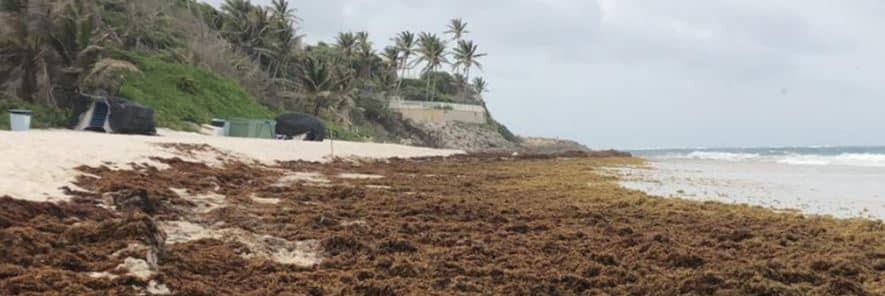Amongst all the chaotic tales of environmental degradation in the Anthropocene, the Caribbean’s toxic seaweed must be one of the strangest. In recent years, sargassum – a type of seaweed – has gone from being an occasional nuisance on the beaches to a serious health problem for the islands’ residents.
Since 2018, there have literally been millions of tonnes of the stuff washing up on Caribbean and western Atlantic Coast beaches. The dying plant matter then smothers coral reefs and other shoreline sea life.

It isn’t exactly clear why there is so much more seaweed washing up on Caribbean beaches in recent years. Researchers are investigating the role of climate change and continually rising nutrient levels in the oceans due to fertiliser run-off.
Sargassum isn’t just an eyesore, though, because the rotting seaweed causes hydrogen sulfide to pass into the air. In some cases, neighbouring residents have suffered significant issues, with the gas irritating nerves, digestion and the respiratory system.
The scenario has necessitated fresh scientific studies. Exposure to 50 ppm of hydrogen sulfide, for instance in a chemical production environment, can trigger respiratory irritation and conjunctivitis in one hour. New research has found that sargassum, however, can expose Caribbean residents to 5-10 ppm of hydrogen sulfide, but for 50 days per year.
The smaller islands rely on desalination plants, and sargassum plays havoc with those as well. The British Virgin Islands has seen its plants so choked by the weed that the tap water comes to smell like rotten eggs and irritate the skin.
This understandably creates a total mess for tourism operators. Hotels have brigades of workmen scooping up the seaweed and crushing it down for fertiliser every day before dawn. In fact, some researchers have shown that the annoying weed could be turned into biofuel. The hope is that it might prove to be a cheaper source of energy than the imported fuel oil most islands rely on. It might at least mitigate the cost of removing the stuff, or at least the mental toll on the islands of having to do so.
Sign Up To Our Free Newsletter